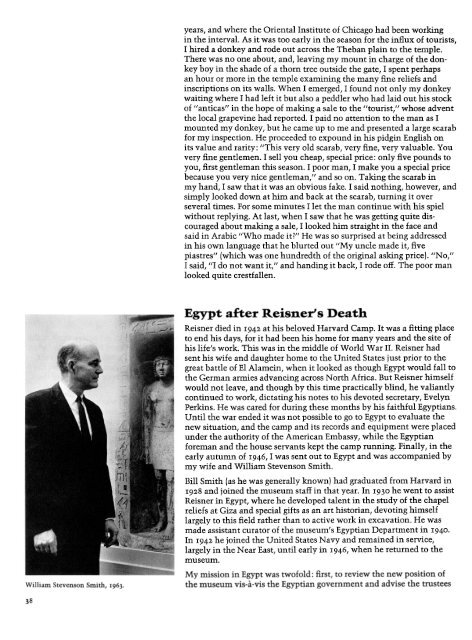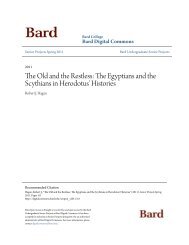Dows Dunham Recollections of an Egyptologist
Create successful ePaper yourself
Turn your PDF publications into a flip-book with our unique Google optimized e-Paper software.
William Stevenson Smith, 1963.<br />
years, <strong>an</strong>d where the Oriental Institute <strong>of</strong> Chicago had been working<br />
in the interval. As it was too early in the season for the influx <strong>of</strong> tourist<br />
I hired a donkey <strong>an</strong>d rode out across the Theb<strong>an</strong> plain to the temple.<br />
There was no one about, <strong>an</strong>d, leaving my mount in charge <strong>of</strong> the donkey<br />
boy in the shade <strong>of</strong> a thorn tree outside the gate, I spent perhaps<br />
<strong>an</strong> hour or more in the temple examining the m<strong>an</strong>y fine reliefs <strong>an</strong>d<br />
inscriptions on its walls. When I emerged, I found not only my donkey<br />
waiting where I had left it but also a peddler who had laid out his stock<br />
<strong>of</strong> “<strong>an</strong>ticas” in the hope <strong>of</strong> making a sale to the “tourist,” whose adven<br />
the local grapevine had reported. I paid no attention to the m<strong>an</strong> as I<br />
mounted my donkey, but he came up to me <strong>an</strong>d presented a large scara<br />
for my inspection. He proceeded to expound in his pidgin English on<br />
its value <strong>an</strong>d rarity: “This very old scarab, very fine, very valuable. You<br />
very fine gentlemen. I sell you cheap, special price: only five pounds to<br />
you, first gentlem<strong>an</strong> this season. I poor m<strong>an</strong>, I make you a special price<br />
because you very nice gentlem<strong>an</strong>,” <strong>an</strong>d so on. Taking the scarab in<br />
my h<strong>an</strong>d, I saw that it was <strong>an</strong> obvious fake. I said nothing, however, <strong>an</strong><br />
simply looked down at him <strong>an</strong>d back at the scarab, turning it over<br />
several times. For some minutes I let the m<strong>an</strong> continue with his spiel<br />
without replying. At last, when I saw that he was getting quite discouraged<br />
about making a sale, I looked him straight in the face <strong>an</strong>d<br />
said in Arabic “Who made it?” He was so surprised at being addressed<br />
in his own l<strong>an</strong>guage that he blurted out “My uncle made it, five<br />
Egypt piastres” after (which Reisner’s was one hundredth Death <strong>of</strong> the original asking price). “No,”<br />
Reisner<br />
I said,<br />
died<br />
“I<br />
in<br />
do<br />
1942<br />
not<br />
at<br />
w<strong>an</strong>t<br />
his beloved<br />
it,” <strong>an</strong>d<br />
Harvard<br />
h<strong>an</strong>ding<br />
Camp.<br />
it back,<br />
It<br />
I<br />
was<br />
rode<br />
a<br />
<strong>of</strong>f.<br />
fitting<br />
The<br />
place<br />
poor m<strong>an</strong><br />
to end<br />
looked<br />
his days,<br />
quite<br />
for<br />
crestfallen.<br />
it had been his home for m<strong>an</strong>y years <strong>an</strong>d the site <strong>of</strong><br />
his life’s work. This was in the middle <strong>of</strong> World War 11. Reisner had<br />
sent his wife <strong>an</strong>d daughter home to the United States just prior to the<br />
great battle <strong>of</strong> El Alamein, when it looked as though Egypt would fall to<br />
the Germ<strong>an</strong> armies adv<strong>an</strong>cing across North Africa. But Reisner himself<br />
would not leave, <strong>an</strong>d though by this time practically blind, he vali<strong>an</strong>tly<br />
continued to work, dictating his notes to his devoted secretary, Evelyn<br />
Perkins. He was cared for during these months by his faithful Egypti<strong>an</strong>s.<br />
Until the war ended it was not possible to go to Egypt to evaluate the<br />
new situation, <strong>an</strong>d the camp <strong>an</strong>d its records <strong>an</strong>d equipment were placed<br />
under the authority <strong>of</strong> the Americ<strong>an</strong> Embassy, while the Egypti<strong>an</strong><br />
forem<strong>an</strong> <strong>an</strong>d the house serv<strong>an</strong>ts kept the camp running. Finally, in the<br />
early autumn <strong>of</strong> 1946, I was sent out to Egypt <strong>an</strong>d was accomp<strong>an</strong>ied by<br />
my wife <strong>an</strong>d William Stevenson Smith.<br />
Bill Smith (as he was generally known) had graduated from Harvard in<br />
1928 <strong>an</strong>d joined the museum staff in that year. In 1930 he went to assist<br />
Reisner in Egypt, where he developed talent in the study <strong>of</strong> the chapel<br />
reliefs at Giza <strong>an</strong>d special gifts as <strong>an</strong> art histori<strong>an</strong>, devoting himself<br />
largely to this field rather th<strong>an</strong> to active work in excavation. He was<br />
made assist<strong>an</strong>t curator <strong>of</strong> the museum’s Egypti<strong>an</strong> Department in 1940.<br />
In 1942 he joined the United States Navy <strong>an</strong>d remained in service,<br />
largely in the Near East, until early in 1946, when he returned to the<br />
museum.<br />
My mission in Egypt was tw<strong>of</strong>old: first, to review the new position <strong>of</strong><br />
the museum vis-a-vis the Egypti<strong>an</strong> government <strong>an</strong>d advise the trustees<br />
38

















